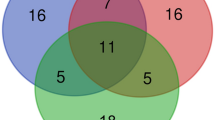Abstract
IN mammals and in Drosophila, it has been found that F 1 incrosses are less variable than their parent inbred lines in respect of a number of characters1. In chickens, Shultz2 has reported an average reduction of environmental variance in egg shape, November egg-weight, and shank-length, in eight F 1's between lines with relatively low degrees of inbreeding (F between 38 and 58 per cent).
This is a preview of subscription content, access via your institution
Access options
Subscribe to this journal
Receive 51 print issues and online access
$199.00 per year
only $3.90 per issue
Buy this article
- Purchase on Springer Link
- Instant access to full article PDF
Prices may be subject to local taxes which are calculated during checkout
Similar content being viewed by others
References
See, inter alia, Claringbold, P. J., and Biggers, J. D., J. Endocrin., 12, 9 (1955). Lerner, I. M., “Genetic Homeostasis” (Oliver and Boyd, Edinburgh, 1954). Livesay, E. A., Genetics, 15, 17 (1930). Maynard Smith, J., and Maynard Smith, S., J. Genetics, 52, 152 (1954). McLaren, A., and Michie, D., J. Genetics, 54, 440 (1956). Robertson, F. W., and Reeve, E. C. R., Z. indukt. Abstamm.- u. Vererb.-lehre, 86, 424 (1955).
Shultz, F. T., Biometrics, 9, 336 (1953).
Yoon, C. H., Genetics, 40, 297 (1955).
Author information
Authors and Affiliations
Rights and permissions
About this article
Cite this article
CLOUGH, M., COCK, A. Variability of Inbred and Incross Chickens. Nature 179, 1030–1031 (1957). https://doi.org/10.1038/1791030a0
Issue Date:
DOI: https://doi.org/10.1038/1791030a0
Comments
By submitting a comment you agree to abide by our Terms and Community Guidelines. If you find something abusive or that does not comply with our terms or guidelines please flag it as inappropriate.



